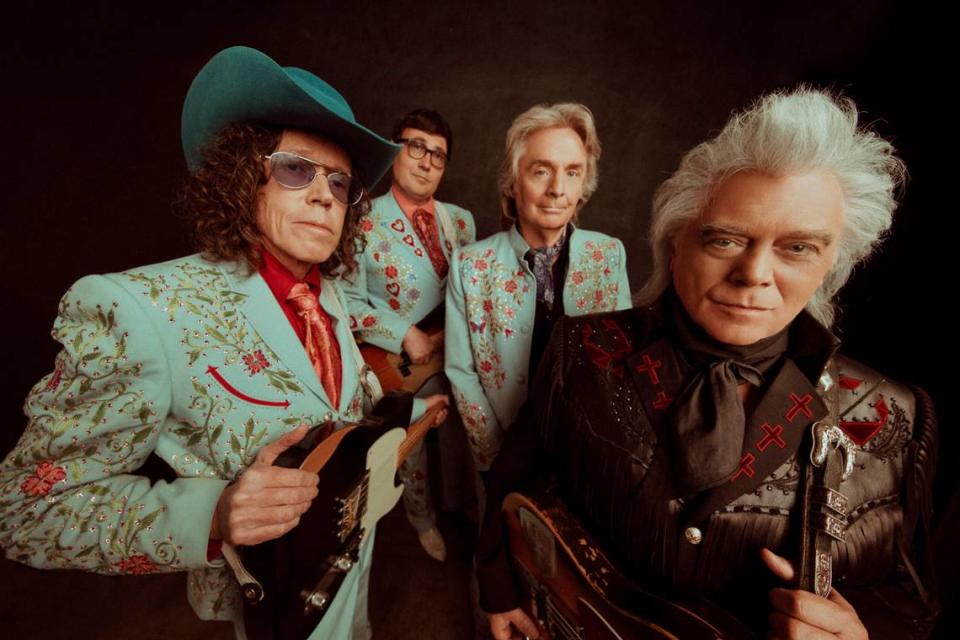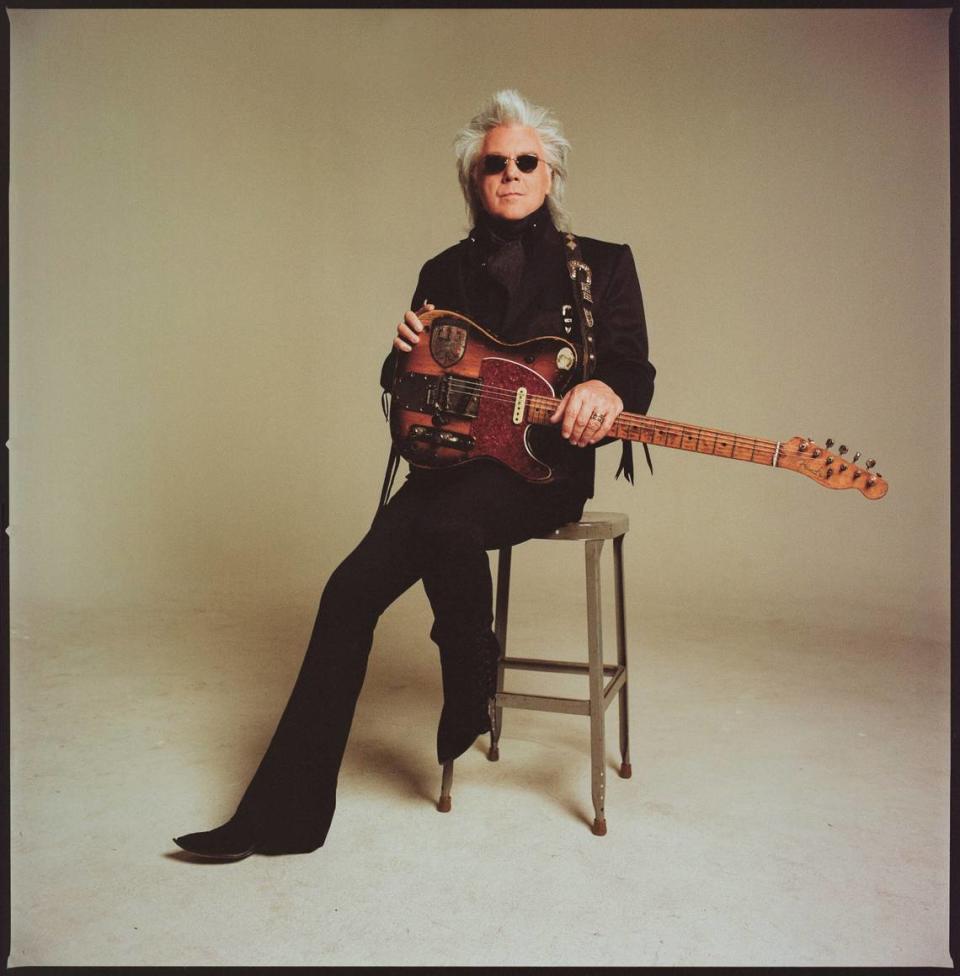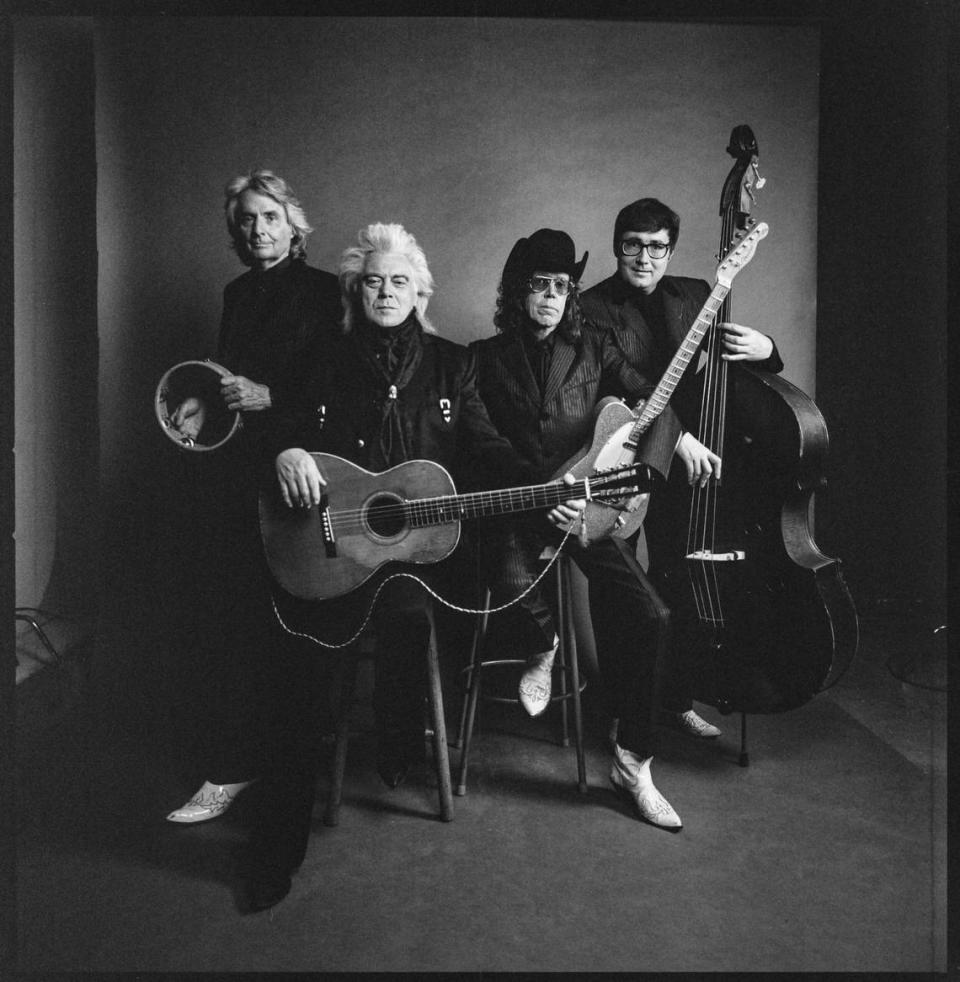Musical time traveler Marty Stuart returns for Lexington show in new venue
Marty Stuart has long been a timekeeper of American music.
Not time as in keeping the beat, although the veteran song stylist has been doing that with an equal sense of groove and tradition alongside his Fabulous Superlatives band for decades.
No, time spent with a Stuart recording or at any of the numerous Central Kentucky performances he has played at Rupp Arena, the Lexington Opera House or Frankfort’s Grand Theatre (and there have been several of late; approximately five visits in as many years) has involved a bit of time travel.
A scholar not just of country music tradition, but nearly every Americana antecedent and offshoot of it, Stuart regularly touches on the inspirations of such cornerstone artists as Johnny Cash, Lester Flatt and Doc Watson, all of whom he has performed with.

A typical Stuart/Superlatives performance works with roots-driven country, country-informed rock, Western swing, psychedelia, bluegrass and even surf tunes.
So is it any wonder that, in recent years, Stuart’s career has gone to the birds? Or more exactly, The Byrds?
Marty Stuart’s connection to The Byrds
The lead off track to his newest album, 2023’s “Altitude,” is the first of two instrumentals titled “Lost Byrd Space Train.” Its jangly guitar lead, along with the way the piece playfully spreads out over the shuffling electric playground set up by his Superlatives mates (guitarist Kenny Vaughan, bassist Chris Scruggs and drummer Harry Stinson) purposely follows a path forged a half-century earlier by The Byrds. The groundbreaking Southern California band remains best known for a handful of distinctive mid-’60s hits even though its later albums traveled kinds of progressive, even renegade roads, into the heart of country music.
This kind of time-tripping is a perfectly natural fit for a journeyman like Stuart. So is the way the song frames components of rock and country as they existed in another era with a dose of psychedelic fairy dust seasoning the resulting music. Stuart may love digging through the recesses of country and Americana, but he is not a musical archivist. Anything he uncovers get a recasting that is respectful, but not completely beholden to, the years those discovered sounds were first created.
The Byrds did pretty much the same thing.
Expect a bit of Byrd-watching at Stuart’s Lexington concert return this weekend (this time to a new venue, the Lyric Theatre and Cultural Arts Center.) The show will come just a few weeks following the very-limited release of a concert recording that brought him face-to-face not only with one the Byrds’ most influential recordings, but with two of the band’s founding members.

Fittingly, the summit took place over five years ago — a time capsule or yet another time escapade.
‘Sweetheart of the Rodeo’ brought them together
In the fall of 2018, Stuart and the Superlatives undertook a three-month tour with Byrds mainstays Roger McGuinn and Chris Hillman to celebrate the 50th anniversary of “Sweetheart of the Rodeo,” a groundbreaking album that set aside much of the psychedelia that blossomed not only around the Byrds’ music, but much of the more innovative rock ‘n’ roll emerging in 1968.
The record was a seminal work for several reasons. It began by bringing Gram Parsons, another fearless Americana navigator, into the band’s ranks. It then delved directly into the heart of country music. Aside from two compositions by Parsons (including, perhaps, his finest tune, “Hickory Wind”), “Sweetheart of the Rodeo” contained no original Byrds songs. It instead surveyed the Americana landscape of previous decades with music by the Louvin Brothers, Merle Haggard, Woody Guthrie and the artist synonymous with the Byrds’ career breakthrough, Bob Dylan.
The record was one of contemporary music’s greatest curve balls. Rock fans were initially perplexed but eventually enchanted by this roots music sojourn. The’60s country music establishment, whose view of rock ‘n’ roll was in no way reciprocal, was enraged. When The Byrds brought songs from “Sweetheart of the Rodeo” to the stage of the Ryman Auditorium in 1968 as the first rock band to play the Grand Ole Opry, the reception was, as Hillman stated in a quote now included in the timeline of the Ryman’s website, “a little colder” than what the band was accustomed to “but not icy cold.”
Fittingly, Stuart, McGuinn and Hillman made the Ryman the fifth stop on the “Sweetheart” anniversary tour. From Amos Perrine’s review of the 2018 Ryman show: “Being Nashville, one would have expected some local gentry to make guest appearances. Fortunately, that was not the case, as the night belonged to the album, and to McGuinn, Hillman, and the music that continues to endure, to resonate and be part of our lives.”
Beef with Ralph Emery
One of the fallouts of the Byrds’ 1968 show was famed Nashville disc jockey Ralph Emery’s very public refusal to play the primary single from “Sweetheart,” a spry reading of Dylan’s “You Ain’t Goin’ Nowhere.”
McGuinn and Parsons responded by penning a tune on the Byrds’ follow-up album, 1969’s “Dr. Byrds & Mr. Hyde” (released after Parsons exited the band). Titled “Drug Store Truck Drivin’ Man,” the song’s sentiments on Emery’s dissing were laid bare in almost playful fashion:
“He’s been like a father to me. He’s the only DJ you can hear after three. I’m an all-night musician in a rock ‘n’ roll band, and why he don’t like me I can’t understand.”
Throughout the 2018 tour, McGuinn, Hillman and Stuart played “Drug Store Truck Drivin’ Man” at the end of an introductory set that prefaced a performance of all 11 songs from “Sweetheart.”
Kentucky figured into the “Sweetheart” tour, but in a somewhat bittersweet manner. The tour played the Brown Theatre in Louisville on Oct. 1, although many Central Kentucky fans eager to see the show (myself included) opted instead for a Oct. 23 stop at the EKU Center for the Arts in Richmond. Two weeks prior to the show date, the latter concert was canceled without explanation.
Byrds fans may have been disappointed, but Stuart’s audience still got their fill. On Oct. 27, he and the Superlatives found themselves onstage at Rupp Arena as the middle act on a sold-out bill opened by Brent Cobb and headlined by Kentucky hero Chris Stapleton.
This spring, five-and-a-half years after the fact, a live recording of the 2018 tour surfaced as “Sweetheart of the Rodeo 50th Anniversary Live.” The only problem: the vinyl-only double album was released in a very limited April run for Record Store Day, a retail celebration where dozens of artists offer exclusive vinyl albums for sale in independent record stores. There is no official word if a second, wider release on digital or CD formats is forthcoming.
For now, though, we have Stuart as the living embodiment of the Byrds’ Americana assimilation. And for the record (pun completely intended), Stuart has been keeping the band’s legacy alive for years. A spirited cover sung by Superlatives drummer Harry Stinson of Woody Guthrie’s “Pretty Boy Floyd,” one of the high-water marks of the original “Sweetheart of the Rodeo” album, remains among the many guideposts Stuart and his band travel though during their concerts. Expect them to pass by it again on Saturday.
“The Byrds’ ‘Sweetheart of the Rodeo’ recording stands as a milestone in American music,” Stuart told Variety prior to the 2018 tour. “I bought my first copy of the record in 1972. Upon my first listen, I was mesmerized at the effect of the combined power country music, rock ‘n’ roll, bluegrass, gospel and folk music had on me. From that day forward, I considered ‘Sweetheart of the Rodeo’ a blueprint as to how I should live my musical life.”

Marty Stuart and his Fabulous Superlatives
When: May 11, 7:30 p.m.
Where: Lyric Theatre and Cultural Arts Center, 300 E. Third
Tickets: $85. Only a few single seats remain. This is a rescheduled performance. All tickets from the originally scheduled Feb. 2 date will be honored.
